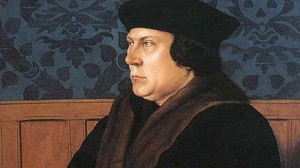 At 3pm on 10th June 1540, while the Privy Council were in session at Westminster, the Captain of the Guard strode into the council chamber with a royal warrant for the arrest of Thomas Cromwell, Earl of Essex, for treason.
At 3pm on 10th June 1540, while the Privy Council were in session at Westminster, the Captain of the Guard strode into the council chamber with a royal warrant for the arrest of Thomas Cromwell, Earl of Essex, for treason.
A furious Cromwell threw his cap to the ground, asked those gathered if “this was the reward of his services” and “appealed to their consciences as to whether he was a traitor”. According to Charles de Marillac, the French ambassador, the reaction of the other council members was for some to say that they thought he was a traitor and others to say that “he should be judged according to the laws he had made, which were so sanguinary that often words spoken inadvertently with good intention had been constituted high treason.”1 The Duke of Norfolk then tore the Order of St George from around Cromwell’s neck and William Fitzwilliam, Earl of Southampton, untied the garter from his leg. Cromwell was then escorted out to a waiting barge and taken to the Tower of London. An inventory was then taken of Cromwell’s belongings at his home at Austin Friars and Marillac recorded:
“The money was 7,000l. st., equal to 28,000 crs., and the silver plate, including crosses, chalices, and other spoils of the Church might be as much more. These movables were before night taken to the King’s treasury—a sign that they will not be restored.”2
The Spanish Chronicle tells a slightly different story, but there are similarities. In its account, Thomas Cromwell’s cap blows off as the council are going to dinner and although, apparently, the custom was for others present to doff their caps if a gentleman lost his, they did not. Cromwell commented “A high wind indeed must it have been to blow my bonnet off and keep all yours on”, but they ignored him. Then, after dinner when they went to the council chamber and Cromwell was just about to sit down, Norfolk said to him, “Cromwell, do not sit there ; that is no place for thee. Traitors do not sit amongst gentlemen.” Cromwell denied that he was a traitor and asked to see the King, but he was arrested and “then the Duke of Norfolk rose and said, ” Stop, captain; traitors must not wear the Garter,” and he took it off of him”.3 He was then taken to the Tower.
Thomas Cromwell, who Henry VIII later referred to as the most faithful servant he’d ever had, was executed on 28th July 1540.
- LP xv. 804
- Ibid.
- Chronicle of King Henry VIII. of England: Being a Contemporary Record of Some of the Principal Events of the Reigns of Henry VIII and Edward VI (The Spanish Chronicle), p98-99